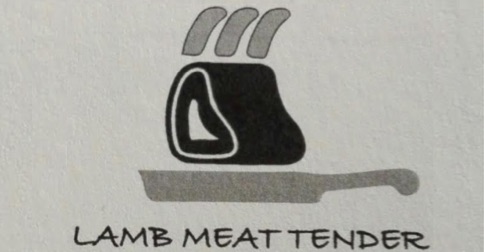Lamb meat tender
 TOKYO – After one of my seminars here, I was taken to a restaurant called Lamb Meat Tender. My immediate reaction to the name was condescending: the throwing together of two English nouns and an adjective seemed typical of the clumsy way in which non-natives can use foreign words. (Think of Westerners’ taste for tattooing themselves with Chinese characters they don’t understand.)
TOKYO – After one of my seminars here, I was taken to a restaurant called Lamb Meat Tender. My immediate reaction to the name was condescending: the throwing together of two English nouns and an adjective seemed typical of the clumsy way in which non-natives can use foreign words. (Think of Westerners’ taste for tattooing themselves with Chinese characters they don’t understand.)
What I didn’t realize is that Japanese people can see the restaurant’s name as a clever pun. It evokes the song Love Me Tender, made famous by Elvis Presley, who is very big in Japan. (A Japanese participant on UCL’s Summer Course in English Phonetics once told me he’d come for the purpose of improving his Elvis impersonation.)
Other native speakers of English might have quicker brains than mine, but I had to have the joke explained to me, mainly because my English brain and ear find lamb and love so different. Firstly, the two words contain different vowels, those of TRAP and STRUT respectively. Secondly, their final consonants are quite different, /m/ shutting the two lips together while /v/ blows air between the top teeth and lower lip:
For the Japanese on the other hand, the two words are almost identical. Lamb and love both seem to contain the Japanese vowel /a/. (Phonetic transcription doesn’t help them that much, because the TRAP vowel is transcribed with a kind of ‘a’, either /æ/ or /a/, while the STRUT vowel is usually transcribed with /ʌ/, which looks like a stylized capital ‘A‘.) And the Japanese don’t have the consonant /v/, which they typically pronounce in English words by drawing both lips together, as in /m/.

“And the Japanese don’t have the consonant /v/, which they typically pronounce in English words by drawing both lips together, as in /m/.”
I’m afraid that is far from true. English words with /v/ are most often pronounced with [b] in Japanese. In Japanese, [β] is sometimes heard in place of /b/, so those who are more acquainted with English are more likely to pronounce them with [β~v].
In orthography, there is a growing trend to transliterate ‘v’ in English loans with the ad-hoc (yet century-old) katakana symbol ヴ, but the pronunciation usually remains [b~β] anyway.
I said that, in words with English ‘v’, the Japanese typically draw both lips together, which is correct, and entirely consistent with what you describe: my statement is by no means “far from true”. Unfortunately you seem to have misunderstood the words “as in /m/”. The lips are drawn together in [b~β], as they are in the [m] of lamb.
We followed the recipe exactly and got a tasteless mix of meat and vegetables at the end… Definitely, something’s wrong with this recipe. We have been to Macedonia and the food there is great, nothing like this.
please visit us: https://www.beckandbulow.com
Interestingly enough, in the last example my nonnative ears can’t hear the ‘v’ sound (except for maybe the first guy). It sounds rather as ‘f’ to me.
Its like you read my thoughts! You seem to know a lot approximately this, such as you wrote the guide in it or something. I think that you could do with some to force the message house a little bit, but other than that, this is fantastic blog. A great read. I’ll definitely be back.